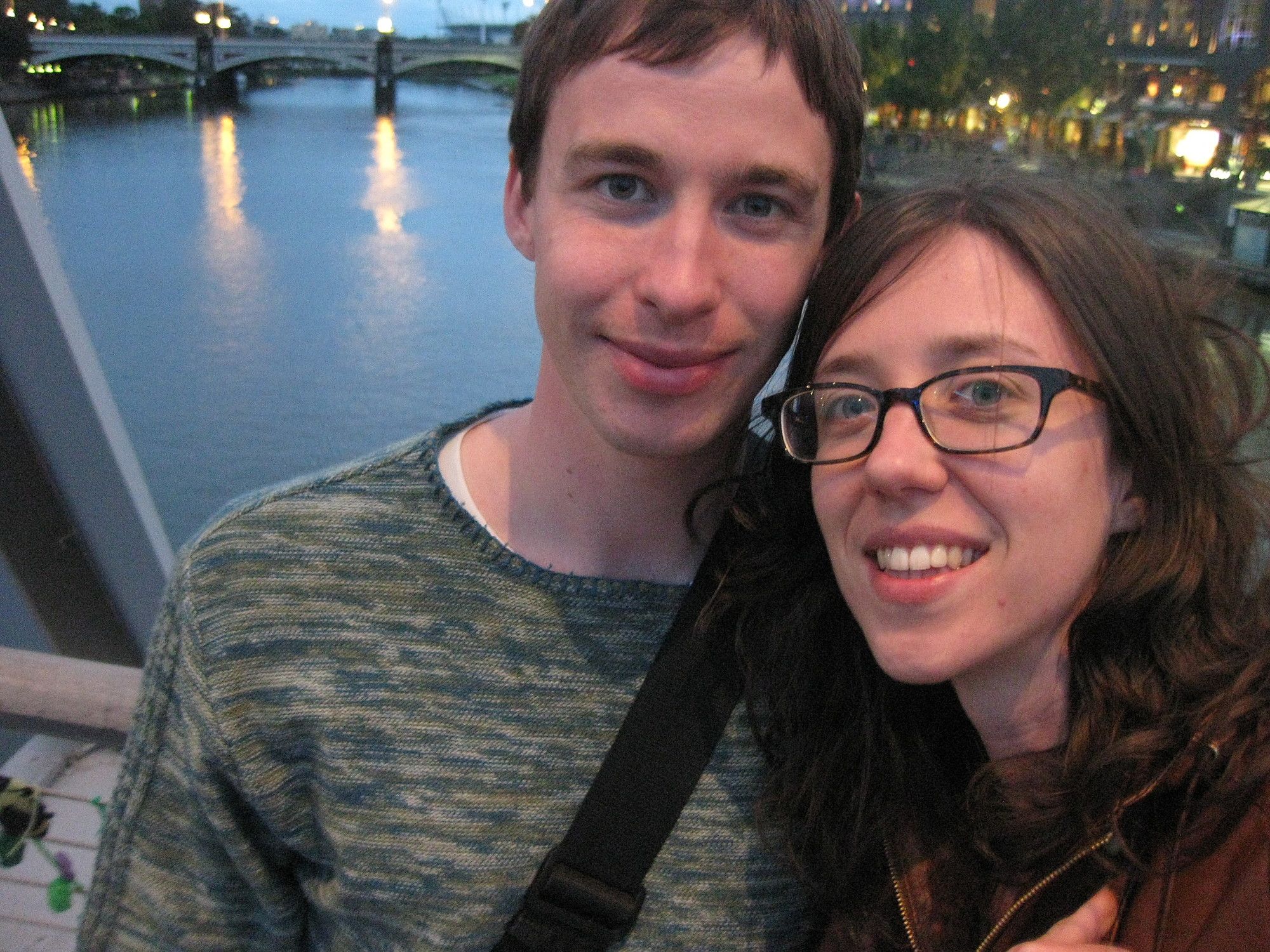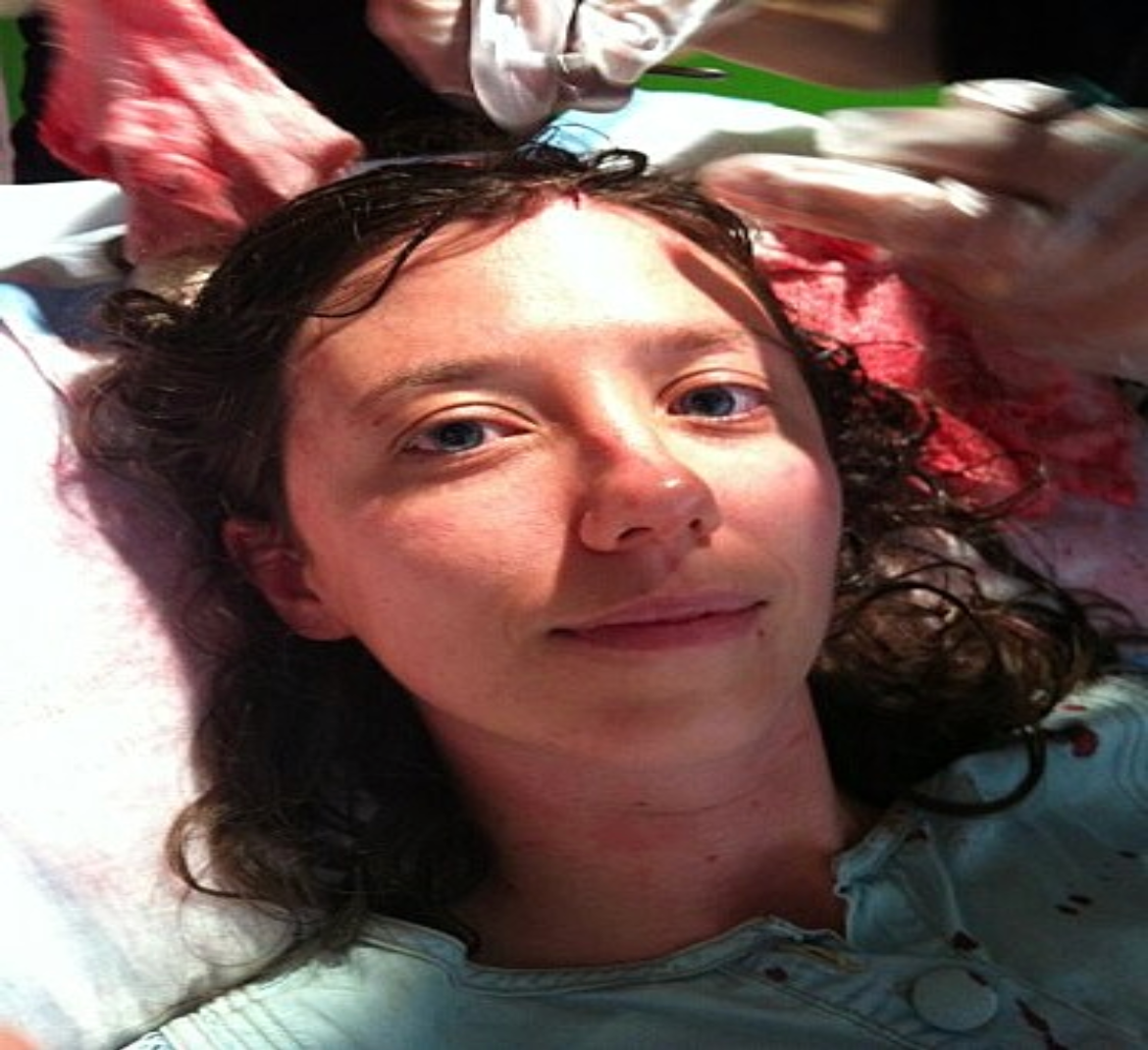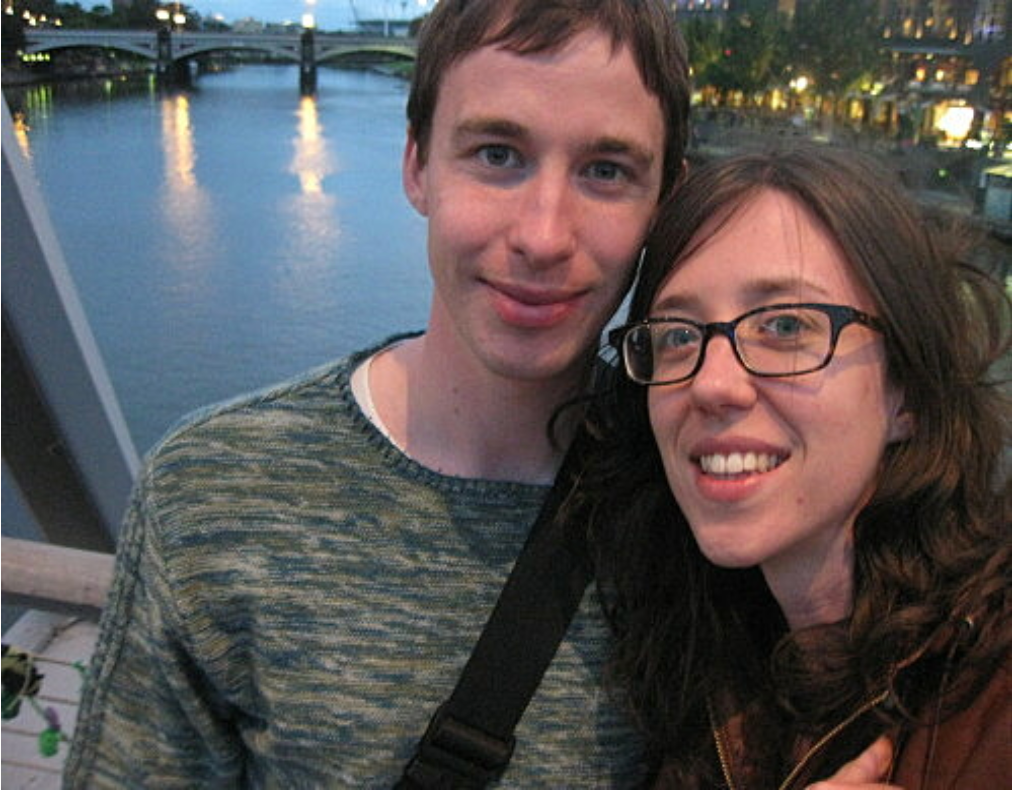Missing Screws and Disappearing Months: Living in the Shadow of a Traumatic Brain Injury
In January this year, a light fitting fell three metres and split Rachel Donnell's scalp. "How bad could it have been?" asks the incident report. "Very serious". Hayden Donnell writes about that afternoon and the seven months that have followed.
When my wife Rachel started screaming for me, I wasn’t there. She’d been sitting at a table having lunch when a light fitting fell three metres and split her scalp. As the blood started dribbling off her hair and into her hands, she yelled at my friend Strahan, “Get Hayden.” The steel had narrowly missed his own head. He was shaken, but he ran. I was around the corner buying ginger beer. Strahan looked fearful as he told me: “Rachel’s okay. Something’s fallen on her head and she’s bleeding. But she’s okay.”
I found her lying on the ground with a resigned look on her face. Blood was rushing from her head, caking her hair and left arm. A nurse, who was only metres away when the accident happened, was applying pressure to the wound and angrily batting away the people who were trying to move her, wanting to keep her still before the medics arrived.
When you find out someone you love is hurt, the world contracts itself inwards. In that instant, the only thing that matters is the crisis unfolding before you. Nothing existed before it. All the emotions that usually get drowned out by the deadening humdrum of everyday life come rushing to the surface. They were always there, buried beneath the drone of a desk job and the clatter of dishes, waiting for an opening. You realise with dawning horror how much you’ve always cared.
I knelt down and took Rachel’s hand and told her I was there. When the paramedics arrived, I couldn’t help it. I asked them if she was going to die. I whispered, so she couldn’t hear. I knew even then it was a stupid question. But there was so much blood. A man in a fluro vest squeezed my shoulder and told me I had to be strong for her.
Gawkers stood around, shocked and titillated. One or two had their cellphones out. Teenagers turned their heads and whispered as the medics lifted Rachel onto a four-wheel-bike and drove her through the crowds to the medical tent where she would receive six stitches in her scalp, just above her hairline.
We had been sitting at a table at a cafe in The Village - Parachute Festival’s central block of shops and food outlets - when the accident happened. Our band Great North was booked to perform that night.
Parachute’s initial report on the incident is brief and matter-of-fact. In response to the question, “Where and how did the accident/serious harm happen?” it reads: “Soul Cravings café. Overhead light fitting fell onto patron’s head”. It states the cause as: “Screws missing from overhead light fitting”. “How bad could it have been?” “Very serious”.
It doesn’t say why this accident happened or who is at fault. All we know is that it was the result of negligence, either by Parachute or someone working to set up their festival.
Under New Zealand law, you’re not allowed to sue if you’re harmed in an accident, whether you slip on a wet bar floor and break your arm or narrowly avoid death by a falling light fitting. In return for giving up that legal right, ACC covers 80 percent of your income until you’re able to go back to work. It subsidises your medical bills. There are few consequences for those responsible for an accident unless their actions are so negligent or result in injuries so disastrous that they warrant an investigation by the Department of Labour.
When the ambulance arrived at the campground, they sent it away: Parachute’s in-house emergency doctor had the situation under control. We didn’t know or care at the time, but had Rachel been taken to hospital, it’s more likely there would have been an investigation into what happened. We were forwarded a letter from the Department of Labour’s Hamilton inspector a few days after we got home. It told us there would be “no further action with regard to this matter”.
Rachel performed our gig that night, and again the next day at the Auckland Folk Festival. It wasn’t until Wednesday that she started feeling sick. A ‘sponge’ was pressing on her brain and her head felt like it was in a vice. My wife of a year, who had always been the counterweight to my disorganised mind, could no longer think straight.
She would go to work and stare at the screen for hours. Come home exhausted. Cry late at night because she couldn’t sleep – quietly, so she wouldn’t wake me up. The days seemed daunting even when she wasn’t tired. Trying to get through them on a few hours rest a night eventually got too much.
The neurologist said she had a traumatic brain injury. Her working memory, attention span and problem solving were affected. In practice, that meant she struggled to plan things. She was nearly always tired. Just about any amount of concentration would cause an intense headache. On the rare times she went out to loud social events, she spent a lot of time grinning on the sides of conversations to hide the fact she was taking virtually nothing in.
Before the accident, Rachel was hard working and high achieving. She loved her job as a speech therapist and looked forward to seeing her friends. These days I’m used to going out without her and leaving for work before she gets up. It’s been six months. Complete recovery is not expected before the end of the year. She missed three months of work and is still only back 12 hours a week.
Parachute were great at first. A genuinely lovely woman called Makerita was assigned to look after us. Festival volunteers took Rachel’s blood-stained dress and scrubbed it clean. We left the festival with arms full of freebies, including a new dress and a T-shirt reading “I kinda like it” in large highlighter letters. Soon after getting home, we received a $200 voucher in the mail, along with a card from Parachute founder Mark de Jong making it clear how sorry he was. The festival director and Parachute’s communications person took us out for a drink in February and told us to keep in touch.
But as Rachel’s medical problems lingered, our relationship with Parachute changed. We emailed in late April to let them know Rachel had been off work for three months and asked them for help covering the thousands of dollars we had lost in reduced wages and medical bills. Their response was more formal – essentially a reminder that they have no legal obligation to help. They were sorry to hear Rachel’s recovery was taking longer than expected but wanted to make it clear the gift voucher was a gesture of goodwill and was not to be taken as an indication that Parachute was able to pay us any compensation. When we asked for an investigation into the cause of the accident, a reason for why this had all happened to us, they referred us back to the initial assessment. It said: “Screws missing”.
It’s easy to get angry about the law, the lack of answers. Parachute didn’t do anything legally wrong. But does that make what happened right? Rachel lost 20 per cent of her income for three months while going through medical treatment for a debilitating injury and they don't have to pay a cent. If ACC aren't going to cover the whole cost of Rachel losing her ability to work, shouldn’t the people who are at fault for her injuries pay the shortfall instead of us? Why didn’t the Department of Labour do a proper investigation? After all, this was a significant head injury, where the most debilitating effects are often not felt until well after the initial trauma.
All of that pales in comparison to the stomach-churning anger I felt seeing Rachel bleeding on the ground. I wanted to kill whoever was at fault. It was a strange, weirdly primal, sense of having failed to protect her. My wife, who has never hurt anyone, had been hurt. Another injustice for the world, this one ours to own.
I don't want to keep being angry. I'm too tired. I would give up the fight against all these grey, bureaucratic wrongs in a second to get my wife back. I miss her. I feel like she's been taken away from me. We lie in bed and we talk about the future. But in my worst moments I’ve felt afraid things will never go back to how they were before January 26, 2013.
Lately there’s been a little hope. The fog in her head seems to be lifting. She went out to her work’s mid-winter Christmas party this week. Soon we’ll go on tour around New Zealand. Maybe next year we’ll take a long holiday. By then, 2013 will probably be a blur. We may forgetthe loopholes in accident compensation law.
But I won’t forget Rachel lying bleeding, the ground dropping out beneath me. All that worry about work, money, the next show, the next commitment, washed away. The threat of loss suddenly bringing into focus the only thing I couldn’t handle losing.
That moment of clarity didn’t last long. But I try to think back to it when I start losing perspective on what's really important. It seems cheesy, a cliché, but what happened to Rachel is a reminder to keep my loved ones close. Everything may seem stable, held tightly in place, but that can change fast. All it takes is a few missing screws.




